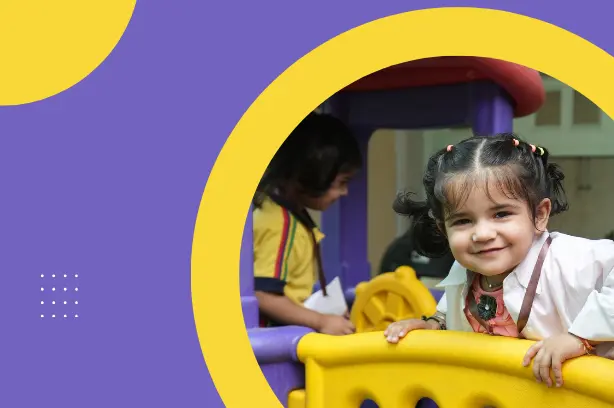18.01.2025
Introduction
Winter holds a special kind of magic for children with frosty mornings, steaming mugs of hot chocolate, the beauty of falling snow, the thrill of new adventures, and the cozy warmth of the holiday season, all of which create lasting memories. However, in winter, it is a struggle to keep small children safe, warm, and healthy. Parents and caregivers need to be attentive to winter safety, especially for preschool-aged children, who may not yet understand the potential risks around them.
In this blog post, we’ll share tips and information to help your preschooler stay warm, safe, and healthy throughout the winter season. Whether this is your first time working with a preschooler or you are quite friendly with preschool life, this guide will outline tips for you to prepare for and enjoy the rest of winter while keeping your child healthy.
Let’s explore how to embrace the enchanting moments of winter while ensuring our preschoolers are safe and sound.

Little Bodies, Big Precautions: Why Winter Safety is Essential for Kids?
As the winter months settle in, it’s essential to remember that young children are more sensitive to the challenges this season brings. With their developing immune systems and their inability to express discomfort clearly, little ones are at greater risk during winter. However, with some thoughtful planning at both home and preschool, we can ensure that they stay safe while enjoying the magic and fun winter has to offer.
Winter Risks for Preschoolers: What You Need to Know!
Winter presents some unique risks for young children from exposure caused by cold temperatures to colds and flu. However, proper preparation and precautionary measures will enable parents and preschools to create an insulated environment where toddlers enjoy the pleasure of winter while protecting their health and well-being.

Cold Exposure: Preschoolers are more sensitive to cold temperatures and may not recognize when they’re too cold. Ensure they are dressed in warm, layered clothing, including hats, gloves, scarves, and boots. Supervising your child on a day with low temperatures while encouraging indoor breaks to warm up is important.
Slippery Surfaces: Outdoor playgrounds are slip hazards for preschoolers. Actively supervise children who play outside to prevent falls and injuries.
Dry Indoor Air: Winter heating can dry out the indoor air causing experiences of irritation of skin and respiratory discomfort. Using a humidifier to offset the drying of indoor air and ensure proper ventilation will allow your child to be comfortable and healthy.
Increased Chances of Illness: Winter is the flu season, and preschoolers are at the most risk. Encourage good habits like washing hands, covering their mouth when sneezing or coughing, and ensuring that your child gets their flu vaccine. Do not forget to keep sick children at home to prevent the spread of illness.
Limited Daylight: Shorter days mean less outdoor playtime. Try to schedule outdoor activities during daylight hours and provide indoor active play to keep children engaged and healthy.
Bye-Bye Winter Blues: A Parent's Handbook to Your Child's Robust Health
In this section, we’ll delve into essential winter safety tips specifically tailored to toddlers, covering everything to ensure your child stays safe, warm, and healthy during the winter months. As the cold weather sets in, here are some key tips that would help your little ones enjoy the winter season to the fullest.

Warm Winter Clothing
Layering your child’s clothing is essential for regulating their body temperature. Start with moisture-wicking base layers to keep sweat off their skin, followed by insulating middle layers like fleece or down, and finish with a waterproof outer layer to protect against wind and rain. Don’t forget hats, gloves, scarves, and warm socks to keep their extremities protected.
Ensure Safe Outdoor Play
Always supervise your child when they play outside, especially in areas where ice or snow can create slippery surfaces. Equip your child with non-slip boots for better traction and teach them how to walk carefully to avoid falls. If your child’s preschool or daycare has outdoor playtime, check to make sure the playground is properly salted and safe for children to play around.
Stay Dry and Comfortable
Wet clothing can quickly lead to chills, so be sure to change your child’s wet clothes immediately after outdoor play. Keeping them dry ensures they stay warm and comfortable, preventing them from catching a cold or cough.
Promote Good Hand Hygiene
Winter is a peak season for cold and flu viruses, making it essential to teach your child good hygiene practices. Encourage frequent handwashing, especially before meals and after outdoor play, and remind them to avoid touching their face, as this can spread germs. If your child is sick, it is best to keep them at home to rest and recover, helping to prevent the spread of illness.
Boost Immune Health
Support your child's immune system and health with a balanced diet filled with colourful fruits, vegetables, and protein. In addition to healthy eating, ensure your child gets enough fluid throughout the day. Getting a flu vaccine and staying up to date with basic immunizations will help protect against common winter illnesses.
Get Plenty of Rest
Adequate sleep is an essential element for the well-being of your child, especially during the winter months. So be sure to let your child sleep enough to energize them and keep them in good health, so they can play and learn well. A well-rested child will be less prone to illness.
Keep Your Child Hydrated
Be as cautious as possible in the winter months as you would during summer. Cold air and warm indoor temperatures can dry your child's body. Your little one must always be encouraged to drink water during the day, even if he or she is not thirsty. Warm drinks like herbal teas will also help keep him or her hydrated and warm.
Handling Frostbite
Frostbite can happen in very cold weather, so it's important to keep your toddler bundled up in layers, including a hat, gloves, and boots. If you see that the skin is pale and cold, bring them indoors and warm the area gently. Never rub or apply hot water. Always supervise them while playing outside to ensure their safety.
Encourage Regular Physical Activity
The winter season can somewhat restrict outdoor play, but keeping active is imperative. Thus, encourage your child to indulge in some indoor activities such as dancing, building blocks, or simple yoga. If possible, bundle up the little ones and enjoy some outdoor play; building snowmen and going for winter walks are delightful ways to keep your child active and healthy.
Winter Safety Checklist: Nurturing Children at Petals Preschool
At Petals Preschool & Daycare, we understand that winter presents unique challenges for both children and caregivers. As the weather gets colder and outdoor activities decrease, your child’s safety is always our top priority. We are your little one’s ultimate caregivers, so you can feel confident knowing your little one is safe, healthy, and happy, no matter the weather.

Our space is curated keeping in mind the individual needs of every child. We are committed to creating a warm and nurturing environment where children can thrive while enjoying the wonders of the season. As the winter season wraps us in its chill, we at Petals Preschool ensure that our little ones stay safe, warm, and happy throughout these colder months.
Here are Petals Preschool’s promises to you and your child this winter season:
Warm and Layered Clothing
We make sure each child is dressed appropriately for winter. Our facilitators ensure that children arrive with layers, hats, gloves, scarves, insulated coats, and shoes, so they stay warm during outdoor play. We also encourage indoor breaks to help them stay comfortable.
Healthy & Enriching Indoor Environment
With winter heating, indoor air can become dry, which may affect children’s comfort. To combat this, we ensure proper ventilation to prevent stuffiness and encourage hydration to keep children’s skin and respiratory systems healthy.
Promoting Good Hygiene Habits
We encourage frequent handwashing and proper respiratory etiquette, such as covering coughs and sneezes. Our facilitators model these behaviors, helping children develop good habits that reduce the spread of germs. We also work closely with parents to ensure that children who are feeling unwell stay home, creating a healthier environment for all.
Adequate Daylight and Physical Activity
With shorter daylight hours, we make sure that children have plenty of opportunities for active play during the day. If the weather keeps us indoors, we provide indoor games that promote movement, coordination, and fun to keep the children energized and healthy.
Comfort and Well-Being of Every Child
We keep an eye on each child’s comfort level in our care, making sure they aren’t too cold or uncomfortable during their time here. If necessary, we adjust clothing or provide indoor time to ensure they are always safe and happy.
In a Nutshell
Winter safety relies on precautionary measures. Parents can help toddlers dress warmly in layers, stay hydrated, promote cleanliness, and ensure a safe play area, both indoors and outdoors, to keep them secure and comfortable during winter breaks. At Petals Preschool, our team of trained and caring facilitators is attentive to any signs of discomfort in cold weather, ensuring each child in our care receives personalized care. We also encourage indoor activities that keep little ones active and engaged while staying cosy. By fostering a warm and safe environment, we aim to make this winter enjoyable and worry-free for both parents and children.
Explore more topics

IntroductionAlthough the US recession is believed to have had little effect on the Indian economy, we all know that the global pandemic would have inevitably caused an economic slowdown. Fortunately,
Learn more
Introduction Winter holds a special kind of magic for children with frosty mornings, steaming mugs of hot chocolate, the beauty of falling snow, the thrill of new adventures, and the cozy warmt
Learn more
Introduction Child development is a broad process. The early years of a child’s life are significant for cognitive, emotional, and social development. Early childhood education is therefore
Learn more
IntroductionPreschool education serves as a child's first formal educational experience outside of the home environment. Preschool programs often incorporate activities that enhance social interaction
Learn more
IntroductionStarting the hunt for the ideal nursery school for your child is a fundamental milestone in their educational career. Since nursery admissions are so competitive, timing is everything. Eve
Learn more
IntroductionCovid-19 Pandemic has adversely affected life across the globe. Family life, school & office closures, limited income sources, restricted social gatherings, and other changes undoubtedly i
Learn more
By now, your toddler has likely enjoyed their second birthday. They're running around, picking up new words every day, and suddenly, someone asks, “Are you planning to send them to preschool?” And
Learn more
IntroductionHave you ever wondered about the realm of preschool and its potential impact on the brilliant minds of our little ones? Do you know that an infant's brain develops rapidly from the time of
Learn more
If you've ever cradled a newborn and tried to fathom the mysteries of that tiny head, you're not alone. The early years are a period when every encounter has the power to define a young mind, carving
Learn more
What is a Preschool Franchise? Preschool Franchise is an unsurpassed small-scale franchise business that draws on incredible ROI (Returns on Investment). Well, before we jump to learn about the Top
Learn more